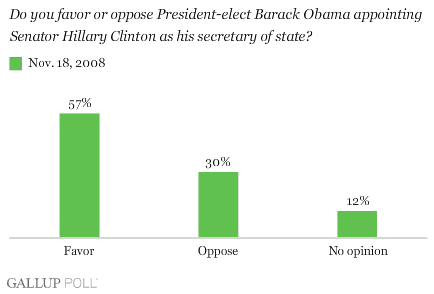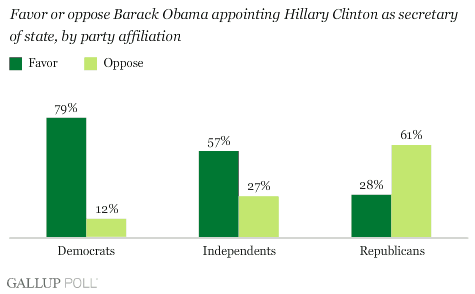PRINCETON, NJ -- A new Gallup Poll finds a majority of Americans (57%) in favor of Barack Obama appointing Hillary Clinton as the secretary of state in his administration. Thirty percent oppose it.

The poll, conducted Nov. 18, was taken as the political world buzzed with the possibility that Obama will bring his chief rival for the Democratic presidential nomination into his cabinet in a high profile role. As secretary of state, Clinton would be the top U.S. official for conducting foreign policy.
Democrats strongly endorse the idea of Obama making this move, with 79% in favor of it. Most Republicans, not surprisingly, oppose the idea, while a majority of independents (57%) favor it.

Clinton would become the third woman to serve as secretary of state, following Madeleine Albright in Bill Clinton's administration and Condoleezza Rice in George W. Bush's administration. While Hillary Clinton has consistently demonstrated a strong appeal to women as first lady and as a presidential candidate, men (56%) and women (58%) are about equally likely to favor her becoming the next secretary of state.
Clinton's appointment as the secretary of state is by no means certain as of now. In addition to news reports that the Obama transition team is still exploring what possible conflicts or problems former President Clinton's international business dealings might pose, it is unclear if Clinton would want to leave the U.S. Senate to serve the Obama administration. Nevertheless, these data do indicate the public would likely react favorably toward her appointment as secretary of state.
Survey Methods
Results are based on telephone interviews with 1,013 national adults, aged 18 and older, conducted Nov. 18, 2008. For results based on the total sample of national adults, one can say with 95% confidence that the maximum margin of sampling error is ±3 percentage points.
Interviews are conducted with respondents on landline telephones (for respondents with a landline telephone) and cellular phones (for respondents who are cell phone only).
In addition to sampling error, question wording and practical difficulties in conducting surveys can introduce error or bias into the findings of public opinion polls.
Polls conducted entirely in one day, such as this one, are subject to additional error or bias not found in polls conducted over several days.
